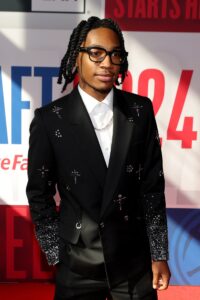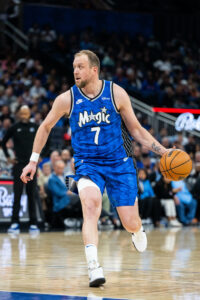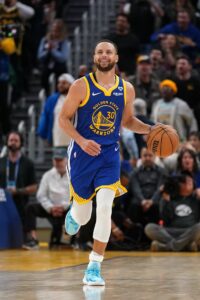Hoops Rumors is checking in on the 2024 offseason for all 30 NBA teams, recapping the summer’s free agent signings, trades, draft picks, departures, and more. We’ll take a look at each team’s offseason moves and consider what might still be coming before the regular season begins. Today, we’re focusing on the Minnesota Timberwolves.
Free agent signings
- Luka Garza: Two years, minimum salary ($4,512,184). Second-year team option. Re-signed using minimum salary exception.
- Joe Ingles: One year, minimum salary. Signed using minimum salary exception.
- PJ Dozier: One year, minimum salary. Partially guaranteed ($1MM). Signed using minimum salary exception.
Trades
 Acquired the draft rights to Rob Dillingham (No. 8 pick) from the Spurs in exchange for the Timberwolves’ 2031 first-round pick and the right to swap their 2030 first-round pick for the Timberwolves’ 2030 first-round pick (top-one protected).
Acquired the draft rights to Rob Dillingham (No. 8 pick) from the Spurs in exchange for the Timberwolves’ 2031 first-round pick and the right to swap their 2030 first-round pick for the Timberwolves’ 2030 first-round pick (top-one protected).- Acquired the Grizzlies’ 2030 second-round pick (top-50 protected; from Grizzlies) and cash ($1MM; from Raptors) in a four-team trade in exchange for Wendell Moore (to Pistons) and the draft rights to Bobi Klintman (No. 37 pick; to Pistons).
- Acquired either the Nuggets’ or Sixers’ 2025 second-round pick (whichever is least favorable; from Hornets/Nuggets), the right to swap their own 2031 second-round pick for the Warriors’ 2031 second-round pick, and cash (from Warriors) in a six-team trade in exchange for Kyle Anderson (sign-and-trade; to Warriors).
Draft picks
- 1-8: Rob Dillingham
- Signed to rookie scale contract (four years, $28,491,575).
- 1-27: Terrence Shannon
- Signed to rookie scale contract (four years, $13,076,519).
Two-way signings
Departed/unsigned free agents
Salary cap situation
- Operating over the cap ($140.6MM), over the luxury tax line ($170.8MM), and above the second tax apron ($188.9MM).
- Carrying approximately $205.6MM in salary.
- No hard cap.
- No form of mid-level or bi-annual exception available.
- One traded player exception available (worth $2,537,040).
- Two traded player exceptions frozen/unavailable (largest worth $8,780,488).
The offseason so far
The Timberwolves’ proximity to the second tax apron hampered their ability to make roster moves this offseason, limiting them to minimum-salary offers for free agents and preventing them from aggregating contracts or taking back more salary than they sent out in trades.
Moving out of second-apron territory likely would’ve required the Wolves to part with one of their highest-paid impact players, an unappealing option after a run to to the Western Conference Finals. Instead, the front office decided to live with those second-apron restrictions and figure out how to replace three departing ball-handlers – point guards Monte Morris and Jordan McLaughlin, along with versatile wing Kyle Anderson – using limited resources.
Minnesota made its biggest offseason move on draft night, using its unprotected 2030 first-round pick and a lightly protected 2031 first-round swap to move into the lottery and then selecting Rob Dillingham with the No. 8 overall pick. It was a creative deal that cleverly circumvented the second apron restrictions — because the Wolves were acquiring Dillingham’s draft rights before he signed his rookie contract, he counted for $0 in incoming salary.
The Wolves also used their own pick – 27th overall – to select Terrence Shannon, another guard. Once viewed as a potential lottery pick, Shannon saw his stock affected by sexual assault allegations during his final college season, but he was found not guilty of all charges ahead of the draft.
 Dillingham and Shannon won’t provide the sort of veteran savvy that Morris and McLaughlin brought to the table and may not be ready to play regular roles right away, but their youth, athleticism, and scoring ability will give the Wolves some real upside off the bench going forward.
Dillingham and Shannon won’t provide the sort of veteran savvy that Morris and McLaughlin brought to the table and may not be ready to play regular roles right away, but their youth, athleticism, and scoring ability will give the Wolves some real upside off the bench going forward.
While there’s hope that they’ll get something out of their rookies in 2024/25, the Wolves needed another insurance policy behind starting point guard Mike Conley, who will turn 37 before the regular season begins. The club turned to the free agent market and landed veteran forward Joe Ingles, who will be reuniting with former Jazz teammates Conley and Rudy Gobert in Minnesota.
Ingles’ skill set bears some similarities to Anderson’s — both players have the size to guard wings and forwards and can serve as secondary play-makers on offense. Even if the rookies don’t contribute immediately, the Wolves should have enough alternatives to Conley at the point, with Anthony Edwards, Nickeil Alexander-Walker, and Ingles all capable of operating with the ball in their hands.
Up next
The Timberwolves currently have 13 players on guaranteed salaries, with PJ Dozier penciled in as their 14th man on a partially guaranteed deal. With Dozier’s salary not fully locked in yet and one additional roster spot still available, Minnesota certainly has the flexibility to bring in one more player to fill out its regular season roster.
Still, the Wolves are way over the luxury tax line, so adding a 15th man or eating Dozier’s $1MM partial guarantee would cost them exponentially more in tax penalties than it would in base salary. With that in mind, I’d expect Minnesota to enter the season with Dozier as the 14th man and be prepared to make a change or add a 15th man only if it’s needed.
Gobert is the most notable extension candidate to monitor ahead of opening night — he holds a player option for the 2025/26 season, so he could reach unrestricted free agency as early as next summer.
Gobert is coming off a Defensive Player of the Year season, but I imagine the Wolves will approach extension talks cautiously rather than jumping headlong into another multiyear deal in the range of his current salary ($43.8MM in 2024/25). Minnesota’s cap situation is already somewhat precarious, with Edwards and Karl-Anthony Towns on maximum-salary deals, and Gobert wasn’t exactly dominant in the Western Finals vs. Dallas or at the Paris Olympics, where he played limited minutes in a couple of France’s best wins.
Gobert will remain extension-eligible all season as long as his player option is replaced as part of a new deal, so the Wolves aren’t facing an October deadline to get something done.
Finally, while it’s worth keeping an eye on the Timberwolves’ ownership fight, the next step in that battle between Glen Taylor and the Marc Lore/Alex Rodriguez group won’t happen until after the season begins. An arbitration hearing is scheduled for November.
 The Raptors are one of the other teams with a new longest-tenured player this season after parting ways with
The Raptors are one of the other teams with a new longest-tenured player this season after parting ways with  Acquired the draft rights to
Acquired the draft rights to  Dillingham and Shannon won’t provide the sort of veteran savvy that Morris and McLaughlin brought to the table and may not be ready to play regular roles right away, but their youth, athleticism, and scoring ability will give the Wolves some real upside off the bench going forward.
Dillingham and Shannon won’t provide the sort of veteran savvy that Morris and McLaughlin brought to the table and may not be ready to play regular roles right away, but their youth, athleticism, and scoring ability will give the Wolves some real upside off the bench going forward.